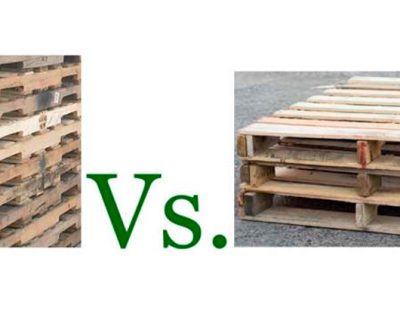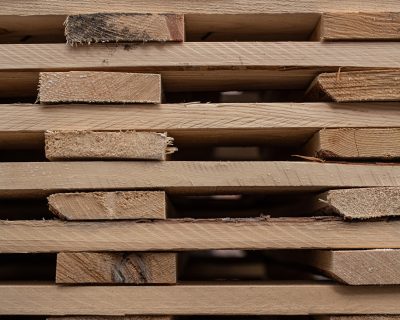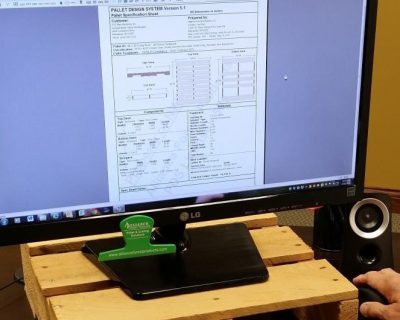
What is ISPM 15 & Why is it a Manufacturing Requirement on all Wood Pallets / Lumber for Export?
Alliance Forest Products uses the conventional Heat Treatment option for the export of any wood pallet or lumber to assure compliance of all ISPM-15 requirements including the IPPC stamp requirement.
* What is ISPM-15?
The letters ISPM are an acronym for International Standards for Phytosanitary Measures #15. The International Plant Protection Convention (IPPC), which is a subdivision of the Food & Agriculture Organization, issues all of the regulations and regulates the international transport of Solid Wood Packaging Materials (SWPM) and the one specific to SWPM is ISPM-15.
* Why is ISPM-15 a manufacturing requirement on all wood pallets & crates for export?
ISPM-15 stipulates the treatments and processes necessary to reduce / eliminate the danger of the start or spread of invasive quarantine pests that can result from the usage of Solid Wood Packaging Materials for shipping cargo internationally. Untreated lumber poses a risk of carrying harmful plant pests. So, this standard was created to significantly reduce the risk of transporting those pests across international borders. In addition, ISPM-15 mandates that every country that participates, must regulate SWPM through their National Plant Protection Organization. For the United States, the NPPO has designated the American Lumber Standards Committee (ALSC) to administer the ISPM-15 program.
* What are the options for a pallet manufacturer / recycler to meet these requirements?
Currently, there are 2 options (processes) that can be used for certified heat treatment:
- Conventional heat treatment (HT)
- Methyl bromide fumigation (MB)
* What is the process for the conventional Heat Treating of SWPM?
To implement the conventional heating treating process, the manufacturer / supplier must have (or have access to) a heat treat chamber that’s been inspected and approved by a certification agency. The wood pallets / lumber is placed in the heat treat chamber. Sensors monitor the temperature of the products as the chamber heats up. Conventional heat treating requires all solid wood components be heat treated to a minimum temperature of 133 degrees F (56 degrees C) for 30 minutes at the core of each piece.
Basically, the HT process is driving most of the moisture from inside the wood to the outer surface. Consequently, if there were any plant pests inside the wood, they can’t survive without moisture. To legally apply the stamp imprint, the facility (i.e. pallet manufacturer or recycler, cargo forwarding company, export broker or pest control agency) must be certified by an inspection agency. These agencies supply auditing and inspection services to certify that facilities are using the appropriate heat treatment process and the stamped imprint as stipulated by ALSC. The industry term is “Heat Treating for Export”. This heat treat requirement includes both hardwood and softwood species of lumber.
* How do I know if my pallets are compliant for export shipping?
Under ISPM-15, there’s no documentation assigned to SWPM that is certifiably treated. Rather, a rubber stamp imprint is applied to the packaging (pallet, crate or lumber) to indicate and verify the proper treatment has been applied and meets all ISPM-15 requirements. All countries that elect to participate in the ISPM-15 program will only export and receive / accept cargo shipments that are properly heat treated and stamped with the appropriate certification imprint. Used and recycled wood pallets must also be heated for export. Below are examples of the various HT stamp imprint layouts.
* What about composite wood products or KD-HT lumber?
KD-HT lumber will meet all ISPM-15 compliance for heat treating because the lumber is dried at the mill in a kiln for approximately 3 weeks to reduce moisture content. KD-HT (Kiln Dried Heat Treat) is performed at considerably higher temperatures and is a longer process. Mills usually stamp their lumber grade which includes the KD-HT imprint. However, all KD-HT lumber will still require a certification agency stamp.
* Are there any restrictions regarding bark on the wood?
Yes, the ISPM-15 program was revised in 2009. The new standard limits bark to strips less than 1.2 inches wide or bark patches no larger than the diameter of a standard credit card.
As an industry leader who’s been supplying a wide range of pallets and pallet services to business throughout the Midwest and Nationally, Alliance Forest Products is here to service your needs. Our dedicated team maintains an ongoing effort to be recognized as a premier supplier for the greater Chicagoland area. So, if you have questions about the ISPM-15 Compliant Pallets or any other pallet services, we want to talk to you.




